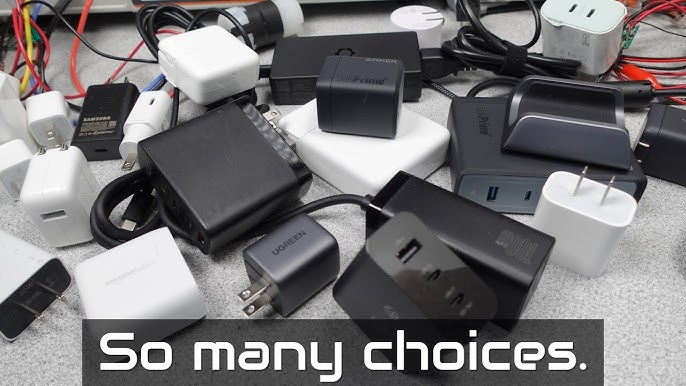Factors That Affect Your Choice of Charger Power?

1. Device Power Requirements
The first and most important factor to consider when selecting a charger is the device’s power requirements. Different devices, such as smartphones, laptops, and tablets, have varying power needs. For example, a smartphone charger typically requires much less power compared to a laptop charger. If you’re charging a MacBook or a high-performance laptop, you will need a charger with higher wattage, such as a 100W USB-C charger or PD charger 65W. On the other hand, for smartphones or smartwatches, a 25W charger or 30W PD charger would be sufficient.
2. Fast Charging Support
As fast charging becomes the norm for many modern devices, the charging power needs to support it. Fast chargers like PD chargers (Power Delivery) are designed to deliver higher power output to charge your devices quicker. For instance, using a 45W USB-C charger for a device that supports fast charging will provide a noticeable difference in charging time. It's important to match your charger’s power output to your device’s charging speed requirements for optimal performance.
3. Charger Efficiency and Heat Management
Another key factor when choosing a charger is its efficiency and heat management. High-wattage chargers, especially GaN chargers, are designed to offer more power while minimizing heat generation. GaN (Gallium Nitride) chargers are more efficient and compact, providing higher output in a smaller form factor. If your charger produces a lot of heat, it can not only slow down charging speeds but also damage your device’s battery over time. 30W GaN chargers are an excellent choice for fast charging with minimal heat.
4. Portability and Convenience
If you're always on the go, portability is a crucial factor. A travel charger that offers fast charging in a compact design is ideal for frequent travelers. USB-C chargers, for example, provide convenience by offering universal compatibility, reducing the need to carry multiple cables. A charger that supports multiple devices, such as a multi-port charger, ensures you can charge your phone, tablet, and other devices simultaneously without needing multiple adapters.
5. Charging Safety
Lastly, safety features play a major role in the selection process. Chargers with built-in overcharge protection, short circuit protection, and temperature management are essential to protect both your device and charger. Certified chargers like USB-IF certified mobile chargers and type C chargers provide an extra layer of safety to ensure optimal charging performance without compromising your device's longevity.
Conclusion
As fast charging becomes more common, it’s important to ensure that your charger not only provides the necessary power but also optimizes safety and heat management.